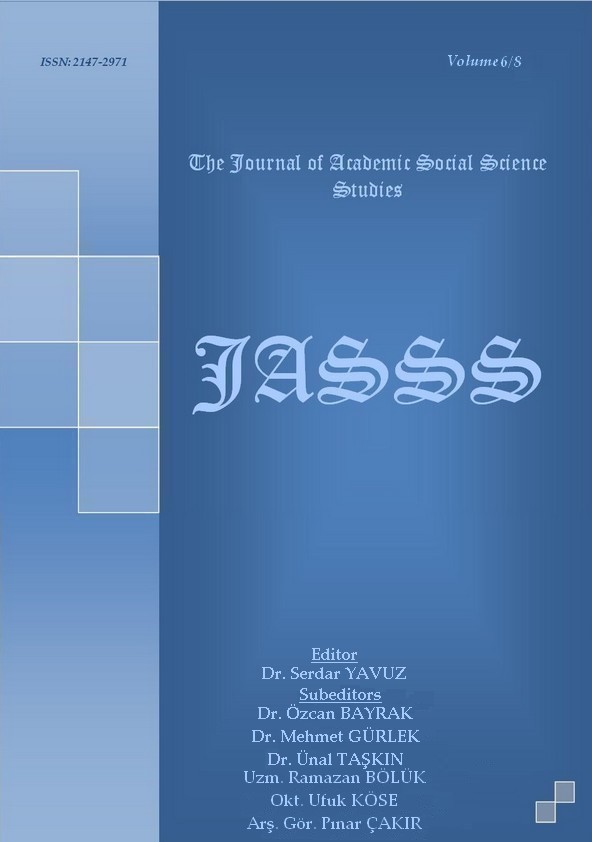Author :
Abstract
Edebiyat ve siyaset kavramları amaçları ve yöntemleri farklı farklı olmasına rağmen tarih boyunca hep birlikte anılır olmuşlardır. Bu birliktelik, zaman zaman karşılıklı etkileme ve menfaat sağlama çabalarından dolayı eleştiri konusu olmuştur. Siyasî iktidarlar taraftar toplamak, güçlerini artırmak ve iktidar sürelerini uzatabilmek için sanatın gücünden faydalanmak istemişlerdir. Aynı şekilde sanatçılar da bazen idealleri için bazen de çıkarları için “patronlara-siyasîlere” destek vermişlerdir. Bu eleştiriler bazen haklı bazen de ne yazık ki haksız gerekçelere dayandırılmıştır. Söz konusu ilişki, Genç Kalemler dergisi ile İttihat ve Terakki arasında da geçerli olmuştur. Son zamanlarda sıkça gündeme getirilen Genç Kalemler - İttihat ve Terakki ilişkisi bu noktada kalmamış Millî Edebiyat eleştirisine kadar uzanmıştır. Bu makalede, Genç Kalemler – İttihat ve Terakki arasında ortaya çıkan ve oradan Millî Edebiyata uzanan süreç dikkatli bir şekilde ele alınarak siyaset - edebiyat ilişkisi açısından sağlam bir zemine oturtulmaya çalışılmış ve bazı yanlış değerlendirmelere dikkat çekilmiştir. Sonuçta tartışma konusu olan maddelerden İttihat ve Terakki’nin kuruluşu ve geçirdiği evreler, II.Meşrutiyet öncesi ve sonrası, mensupları ve aralarındaki fikir ayrılıkları ortaya koyulmuştur. Sonra Genç Kalemler dergisinin çıkarılış aşamaları, mensupları, bunların İttihat ve Terakki ile olan ilişkileri adım adım tespit edilmiş ve ardından Millî Edebiyat kavramı etrafından yapılan tartışmaların sakıncalarına kısaca değinilerek ileri sürülen görüşlerin bir değerlendirmesi yapılmıştır.
Keywords
Abstract
Although the purposes and methods of the concepts of literature and politics are different from each other, they have been mentioned together throughout history. This togetherness has been the subject of criticism occasionally because of the efforts to ensure mutual influence and benefit. Gather support for the political powers, increase their power and extend the duration of power wanted to take advantage of the power of literati. In the same way, sometimes in the interests of literatis, sometimes to the ideals of "bosses-politicians" have provided support. These criticism are based on sometimes right but sometimes, unfortunately, unfair grounds. The relationship here, is applicable between The journal of Genç Kalemler – İttihat ve Terakki. The relationship of Genç Kalemler – İttihat ve Terakki that is raised frequently, recently, hasn’t stopped at this point and it has reached to the criticism of Milli Edebiyat. In this article, the process arised between Genç Kalemler - İttihat ve Terakki and then reached Milli Edebiyat is evaluated carefully and it is tried to put on a base in terms of the relationship of literature- politics and some incorrect evaluations are pointed. At the end, a result that is subject matter of discussion, the evolution of İttihat ve Terakki and the process of it, before and after of II. Meşrutiyet and its members and the disagreements of them are revealed. After than, the stages of publication of the journal of Genç Kalemler, its members, and the irrelationship with İttihat ve Terakki have been identified step by step and then by mentioning the drawbacks of debate around the concept of Milli Edebiyat, a brief assessment is made with reference to the views put forward.





